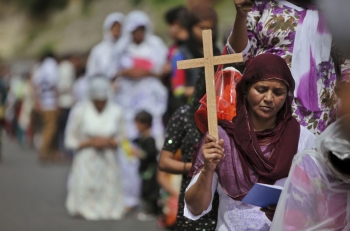
.jpg) Yacub Kujur
Yacub Kujur

Delisting is a demand from certain sections of the Hindus to remove the converted indigenous people to Christianity and Islam from the list of Scheduled Tribes (STs). Those who support the demand say that the tribals who have converted cease to be Scheduled Tribes. But the Supreme Court judgment says, “By reason of conversion, a tribe does not cease to be tribe.” (SC Case 429 (240), 2004 AIR SCW1064) Article 342 of the Indian Constitution specifies the tribes or tribal communities {read with 366(25)}. The issue is attracting media coverage, especially in the local media.
Why delisting? The main controversy over the issue is reservation and its benefits being given to the converted tribal Christians. The Constitution provides three types of reservations to Scheduled Tribes: 1. In government educational institutions (Arti.15-4); 2. In government jobs and promotions (Arti. 16-4): and 3. On seats and special representation in legislatures. Since the tribal Christians are more educated, they have accessed more jobs than non-converted tribals. The converted tribal people’s life is economically better than their counterparts. But they are still backward in representation in legislatures. The awareness over it is visible among them which rings alarm among political parties.
As it is observed, the tribal Christians bend towards Congress and the Hindu tribals towards BJP. This tendency has infuriated the BJP and the RSS. They have succeeded in brain washing the Hindu tribals. The local BJP and RSS leaders cease to receive homage from tribal Christians. For the loss of respect and gain, they are taking revenge on tribal Christians. Delisting, conversion, “Gharwapsi” are just political games, means of making Hindu Rashtra. It is to be noted the reasons for the conversion of tribals. If the tribals were taken care of in education, health and economic development why would have they been converted? Are these local landlords (belonging to RSS, BJP and even leaders of some other parties) not responsible for this?
What’s happening is polarization of tribals for political gain. The BJP and the RSS have polarized tribals in the name of religious conversion. The tribals have been divided into Hindu tribals and Christian Tribals. The Hindu tribals with the support of the RSS and the BJP are demanding delisting of Christian tribals, while the latter are opposing it. The tribals who are demanding delisting consider themselves first as Hindus and then tribals; they are called Vanvasi by the BJP and the RSS and not Adivasis. Those opposing delisting consider themselves first as tribals and then Christians.
Hindu tribals blame tribal Christians for distorting and not following tribal customs and traditions; on the other hand, the tribal Christians claim that they are the custodians of tribal customs and traditions. They are enriching Christian faith by inculturating tribal belief, customs and traditions whereas Hindu tribals are ‘Hinduising’ the tribal culture. The tribal Christians have kept up their totem; on the other hand, Hindu tribals have lost their totem and are writing Bhagat, Pradhan, etc. as their surname. Hindu tribals are giving slogans like “Jo Bholenath ka nahi, O Adivasi nahin” (one who does not belong to Bholenath is not a tribal). Uraon tribes call the Supreme Being “Dharnes”, not Bholenath. This name is not found in Uraon traditional belief system.
The Constitution affirms that tribals are not Hindus. Patna High Court, in a judgment, confirms that original aboriginals who got converted to Hinduism and are following Hindu religion are presumed that they will be governed by Hindu Laws (AIR 1931 Pat 305: Ganesh Mahto and others verses Shivcharan Mahto and others and AIR 2004 Jharkhand 121: Lakshmi Narayan Tudu/Lakshmi Narayan Manjhi and others versus Smt. Basi Majhian and others).
Rallies and public meetings are being held in favor of delisting and against it. Memorandum are submitted to various authorities in this regard. A competition is going on to prove who is following the traditional customs and customary laws.
What will happen now? Article 244 provides provision for administration of Scheduled Areas and tribal Areas, known as Fifth and Sixth Schedule. The Fifth Schedule Area is declared on the basis of tribal population. Where more than fifty percent of the Scheduled Tribes reside, the area is declared as Fifth Schedule and Constitutional benefits are provided, especially reservation of seats and provision of PESA (Provision of Panchayats Extension to Scheduled Areas Act, 1996). With the delisting of tribal Christians and Muslims, the number of Scheduled Tribes will decline, and the area will be de-scheduled. For example, Jashpur district of Chhattisgarh is a Schedule Area comprising 62% of tribal population. Among them, the tribal Christians consist of 22%. If they are delisted the total number will decline to 40% and the area will be de-scheduled. The tribals will lose the benefit of representation and Tribal Sub-plan (TSP).
The allotment of TSP will be less and the area will witness low development works due to lack of money leading to rampart distress migration and human trafficking. The power of Gram Sabha will vanish and there will be rapid looting of tribal land, forest, water and other resources in the name of development. If they protest, they will be labeled as Naxals, anti-nationals and put into jails. They will languish there without framing of charges or trial for long period. The human rights activists who will speak up against the plight of the tribals will be labeled as urban Naxals and put behind bars under UAPA.
What is needed at this juncture is that tribals should remain as brothers and sisters as they were from time immemorial, irrespective of creed and political allurement to save their ‘tribalness’, forest land and water. Fighting against one another brings ruin for them, and prosperity to enemies. Knowing one’s friends and foes is the need of the time.
(The writer is a Social Activist and Director of Jeevan Vikas Maitri, Pathalgaon, Jashpur, Chhattisgarh: jacobkujur@gmail.com)